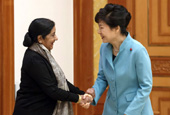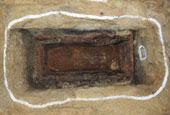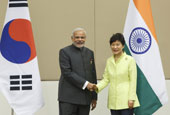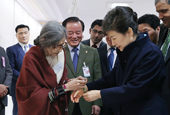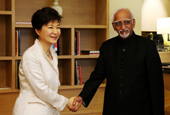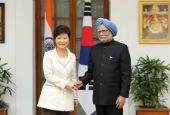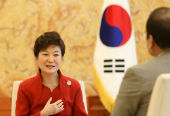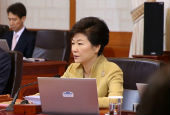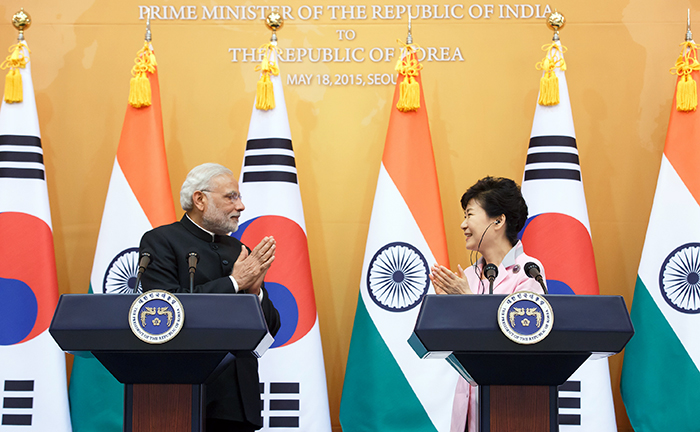
President Park Geun-hye (right) and Indian Prime Minister Narendra Modi put their hands together, politely acknowledging each other, after holding a joint press conference on May 18.
"The adoption of a joint statement to change the Korea-India relationship into a special strategic partnership is the result of the two governments' will and effort," said President Park Geun-hye and Indian Prime Minister Narendra Modi during their joint press conference on May 18.
President Park held a summit meeting with Prime Minister Modi, who was paying a state visit to Korea that day. The two leaders upgraded their bilateral relationship to a, "special strategic partnership."
"Over the past 42 years, the Korea-India relationship has made significant progress," said President Park. "In particular, the Comprehensive Economic Partnership Agreement (CEPA) between Korea and India took effect in 2010. It solidified the basis for our bilateral economic cooperation and contributed to an increase in the exchange of the arts and people."
"Today, Prime Minister Modi and I discussed ways to expand bilateral cooperation on various issues to further deepen our existing relationship," said President Park. "I am very glad that Prime Minister Modi and I were able to adopt a joint statement for the Korean-Indian 'special strategic partnership,' based on a dialogue that, starting today, will open a new era of our bilateral relationship."
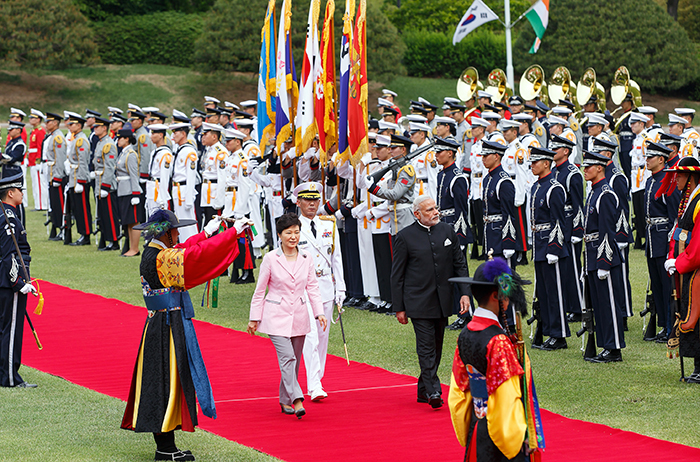
President Park Geun-hye (middle, left) and Indian Prime Minister Narendra Modi walk side by side in the Daejeongwon Garden of Cheong Wa Dae during the official welcoming ceremony for his state visit on May 18, as honor guards line the red carpet.
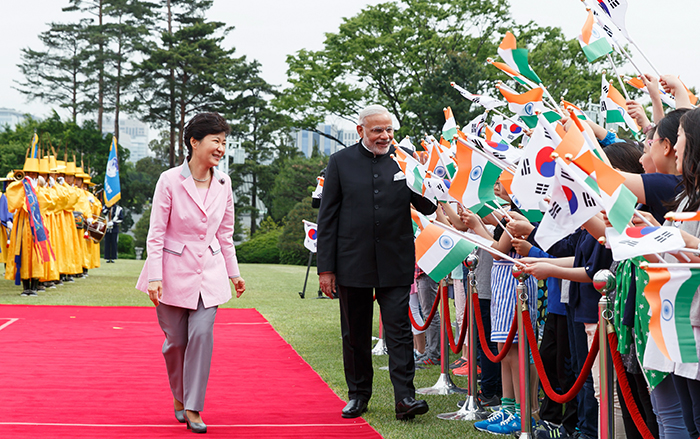
President Park Geun-hye (left) and Indian Prime Minister Narendra Modi greet children who wave national flags of the two nations during the official welcoming ceremony on May 18.
Concerning their special strategic partnership, President Park said, "The two nations agreed to strengthen bilateral partnership channels in a bid to systematically develop our bilateral cooperation on politics and security. We agreed to establish annual summit meetings and hold joint commissions every year led by the two foreign ministers. We also agreed to establish a joint vice ministerial level defense and foreign affairs dialogue using a '2+2' format and to further strengthen regular consultations between the National Security Councils of the two nations. We also agreed to actualize our bilateral cooperation on national defense and defense industry."
The two nations agreed to upgrade the Comprehensive Economic Partnership Agreement (CEPA), which took effect in 2010, and to start negotiations to amend it by June 2016. With the signing of the revised Double Taxation Avoidance Agreement, the two nations intend to further improve the business environment in each country.
"Prime Minister Modi asked Korea to become a special strategic partner to pursue his 'Make in India' policy, which is designed to develop India's manufacturing industries," said President Park. "In response, I expressed my will to share Korea's economic development experience, especially experiences in developing manufacturing industries, and to actively cooperate for the mutual development of both nations."
In terms of exchanges in the arts, education and between people, cultural festivals will be held in both nations this year and next year. The two nations also agreed to jointly improve a monument in Ayodhya, India, dedicated to Queen Hur Hwang-ok (c. A.D. 100), also known as Queen Suriratna, who is linked to Korean history.
For the peace and security of the Korean Peninsula, President Park said, "Prime Minister Modi and I expressed concern over the development of North Korea's nuclear weapons and ballistic missiles. We had the common understanding that the North needs to fully comply with all of its international obligations, including under the relevant U.N. Security Council resolutions, and to fulfill its commitments under the 2005 Joint Statement of the Six-Party Talks."
"I explained the South Korean government's efforts to prepare for a peaceful reunification of the Korean Peninsula, and Prime Minister Modi expressed his support," the president added.
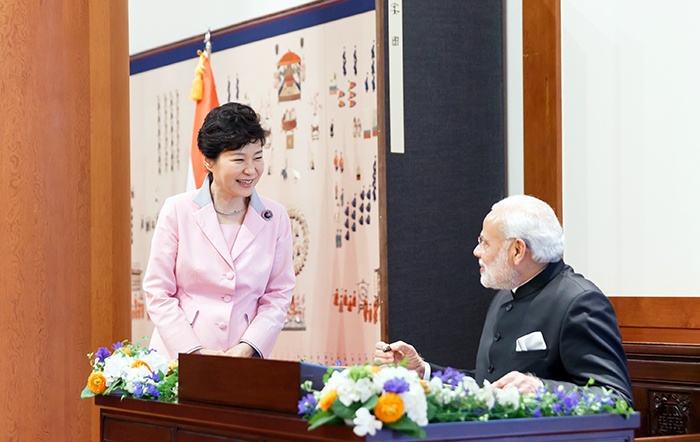
President Park Geun-hye speaks to Indian Prime Minister Narendra Modi as he signs the guestbook at Cheong Wa Dae on May 18.
"India's economy faces a turning point in which new momentum is being formed," said Prime Minister Modi. "We are now focusing on building infrastructure and trying to establish world-class manufacturing industries. Korea can become an essential partner in that effort."
"Today's agreements reflect an earnest stance for a new frame of our bilateral relationship," said Prime Minister Modi. "Korea is the second country with which India agreed to establish a joint defense and foreign affairs dialogue using the '2+2' format."
"I believe Korean companies have the ability to succeed in India," said Prime Minister Modi. "We intend to establish cooperation channels to help and encourage Korean companies to invest and do businesses in India. I also asked President Park to encourage Korean companies to take part in newly-developing industries in India. I asked for investment in the defense and shipbuilding industries, including defense equipment and LNG containerships."
By Jeon Han, Limb Jae-un
Korea.net Staff Writers
Photos: Cheong Wa Dae
hanjeon@korea.kr
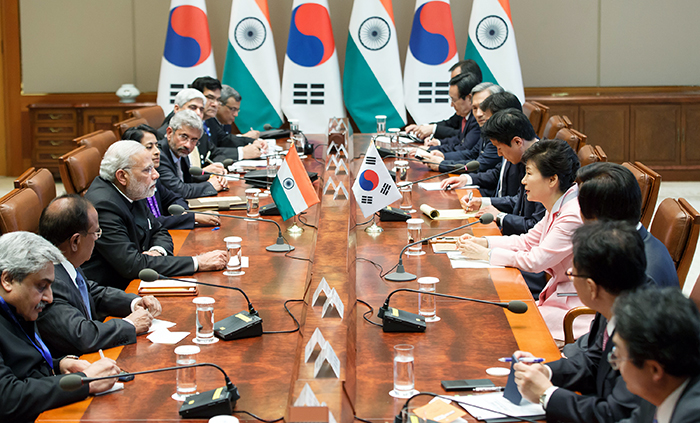
President Park Geun-hye (fourth from right) and Indian Prime Minister Narendra Modi, who is paying a state visit to Korea, hold a summit meeting at Cheong Wa Dae on May 18.
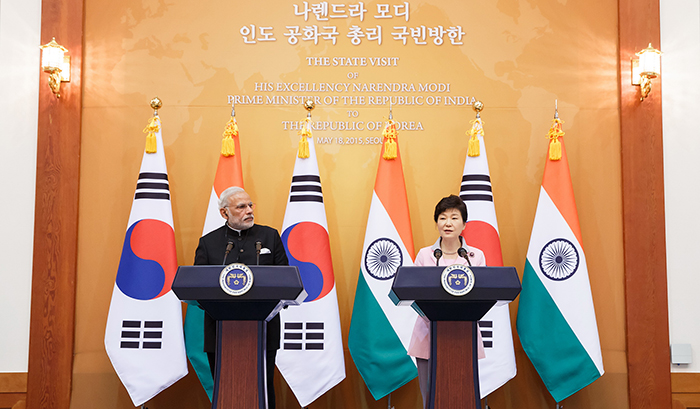
President Park Geun-hye (fourth from right) and Indian Prime Minister Narendra Modi, who is paying a state visit to Korea, hold a summit meeting at Cheong Wa Dae on May 18.
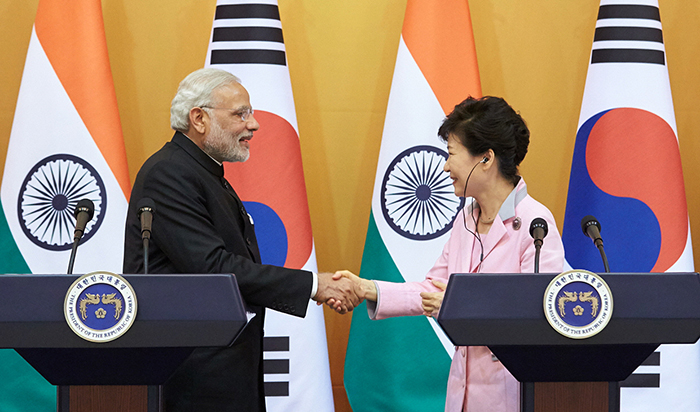
President Park Geun-hye (right) and Indian Prime Minister Narendra Modi shake hands after holding a joint press conference on May 18.
Related Contents
Most popular
- Slew of festivals, events scheduled in downtown Seoul in May
- 2025 Honorary Reporter class pledges to spread 'real Korea' worldwide
- Actor Tom Cruise proves 'love for Korea' with 12th visit
- Netflix releases official trailer for final season of 'Squid Game'
- Jeju Island completes prep to host series of APEC meetings
